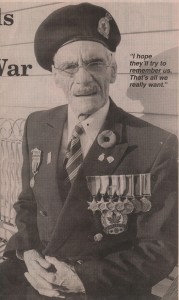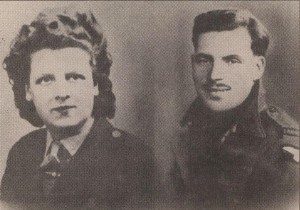Reprinted from The Packet, November 4, 2002
by Joan Over
In November of 1939, a special announcement was made over Newfoundland radio. Volunteer loggers were being recruited to work in Great Britain, cutting the wood to be used to build tunnels and other structures vital to the war effort.
The men would be paid two dollars a day. Transportation and accommodation would be provided, but personal needs, such as clothing, were to be supplied by the men themselves.
Among the many Newfoundlanders who answered that call to join the newly created Newfoundland Overseas Forestry Unit was 22-year-old Leander Drodge of Little Heart’s Ease.
“In the forestry, my job was putting up cookhouses and putting in utensils for cooks in camps in Scotland and the west of England,” Mr. Drodge recalled.
Although Mr. Drodge had plenty of knowledge about cooking meals – he’d cooked at sea since the age of 14 – his real desire was to join the navy.
“I wanted to join the Navy because I was used to the water,” he said. “Newfoundlanders were always good in the Navy.”
Mr. Drodge travelled to Edinburgh to sign up, but soon discovered that no one was being recruited for the Navy at that time.
“Dunkirk was on and England was at a standstill. But they were looking for gunners, so I volunteered for the RAF instead,” he said.
Even as Nazi bombs fell on some of the places in England and Wales where he was stationed, Mr. Drodge took intensive courses to prepare himself for perilous missions over Italy, France, Africa, the Middle Ease and numerous other places.
“I never had to write them all down, but I’d say there were about 150 to 200 places,” he said.
It was dangerous work, usually in small single-engined planes, often flying at night over uncharted territory. Many gunners and pilots lost their lives.
In those dark days, early in the war, Allied forces were struggling against overwhelming odds. Proper equipment and ammunition was scarce. Mr. Drodge recalls frightening moments, both in the air and on the ground.
“I remember we stood on the beaches of Dover with only one real rifle for every 10 men. The rest were imitation, made out of wood,” he said. “That was all we had.”
Several times, Mr. Drodge was badly injured, once ending up in a hospital in Nazareth for more than three months. Near Marseilles, France, he was declared missing in action.
“The Air Defence Minister sent a message to my grandmother, saying that her grandson was missing,” he said.
Mr. Drodge met his English wife, Catherine Fieldhouse, in Liverpool, after another arduous ordeal.
“I was on a ship that was torpedoed in Liverpool Harbour,” he said. “A Scotsman and I swam ashore together. I don’t know how many people went down on that boat.”
Even after more than 60 years, the bodily and mental strain of war is still painful for Mr. Drodge.
“It’s hard for me to talk about it,” he said. “It was a bit too tough.”
When the war was finally over, Mr. Drodge returned with his wife to Newfoundland, where they raised five children – two boys and three girls. His wife passed away nearly four years ago.
Now 86, Mr. Drodge lives in Clarenville, where he is active in the Royal Canadian Legion, Canada’s largest veterans’ association.
Besides having been a chaplain and serving on the executive of the Legion, Mr. Drodge helps every year with the annual poppy campaign and is proud of his association with the Juno Beach project, a Canadian war memorial and educational facility to be built at Courdeulles-sur-Mer in France.
“I’m a member of the GWA, the Great War Association, and have been since 1947,” he said proudly. “I’m always on the go. I don’t stop.”
On November 11, Remembrance Day, thousands of Newfoundlanders will wear poppies, gather at war memorials and observe a minute of silence in tribute to the tremendous debt we all owe to those who defended our country and our freedoms during two world wars and other military missions around the world.
“I hope they’ll try to remember us,” Mr. Drodge said, “That’s all we really want.”
_________________________________
Clipping provided by Lester Green
Transcribed by Wanda Garrett, October 2015
These transcriptions may contain human errors. As always, confirm these as you would any other source material.

